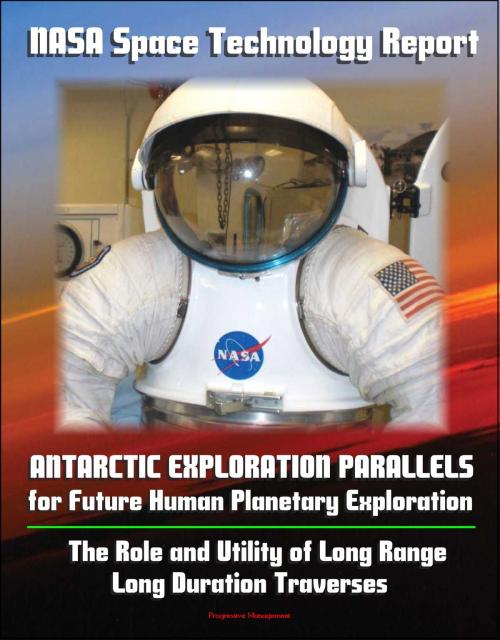NASA Space Technology Report: Antarctic Exploration Parallels for Future Human Planetary Exploration: The Role and Utility of Long Range, Long Duration Traverses
Nonfiction, Science & Nature, Technology, Aeronautics & Astronautics, Science, Physics, Astrophysics & Space Science| Author: | Progressive Management | ISBN: | 9781301925247 |
| Publisher: | Progressive Management | Publication: | August 7, 2013 |
| Imprint: | Smashwords Edition | Language: | English |
| Author: | Progressive Management |
| ISBN: | 9781301925247 |
| Publisher: | Progressive Management |
| Publication: | August 7, 2013 |
| Imprint: | Smashwords Edition |
| Language: | English |
This report describes a two-day workshop at the NASA Johnson Space Center discussing lessons learned from traverses, driven largely by science objectives, in the Earth's polar regions. These lessons are viewed as contributing one facet of NASA's preparation to explore, over extended periods of time, the surface of the Moon, Mars, and the inner solar system. More than 60 years of extensive traverses in both the Arctic and Antarctic provide a potentially rich source of lessons for future planetary missions under analogous conditions. Results from this and a previous workshop (Hoffman, 2002) examining the similarities of space and polar exploration both indicate highly parallel activities and functional needs. However, as Henry Kissinger has noted: "History is not, of course, a cookbook offering pretested recipes. It teaches by analogy, not by maxims." So it was also recognized during the course of discussions at the workshop reported here that NASA's current approach for long-duration planetary surface operations has fundamental differences from any of the operational approaches described by the invited speakers. Choices made regarding these approaches drive the crew size and skill mix, as well as the system capabilities, needed to accomplish basic mission objectives. These, in turn, drive the logistical pyramid needed to support operations. The key then is to learn the lessons from Arctic and Antarctic traverse and adapt them to future planetary missions. This workshop attempted to facilitate this learning process by arranging for a direct interaction between those who created the history of Arctic and Antarctic traverses with those who are tasked with creating the future history of these traverses on other planets.
CHAPTER 1 - INTRODUCTION * 1.1 Workshop Motivation * 1.2 Workshop Structure * 1.3 Report Outline * CHAPTER 2 - PROJECTED PLANETARY SURFACE TRAVERSE SYNOPSES * 2.1 Overview * 2.2 Mars Surface Traverse Options * 2.2.1 The "Mobile Home" Concept of Operations * 2.2.2 The "Commuter" Concept of Operations * 2.2.3 The "Telecommuter" Concept of Operations * 2.2.4 Science Community Inputs * 2.2.5 The "Sortie" Concept of Operations * 2.3 Summary and Implications * CHAPTER 3 - INVITED PARTICIPANTS * 3.1 Mary Albert * 3.2 Charles Bentley * 3.3 Johan Berte * 3.4 Richard Cameron * 3.5 John Gruener * 3.6 Friedrich Horz * 3.7 Gary Lofgren * 3.8 Charles Swithinbank * 3.9 Marie-Claude Williamson * CHAPTER 4 - SELECTED ARCTIC AND ANTARCTIC TRAVERSE SYNOPSES * 4.1 Norwegian-British-Swedish Antarctic Expedition of 1949-52 * 4.2 International Geophysical Year Traverses (1956 - 1958) * 4.3 South Pole Queen Maud Land Traverses * 4.4 Contemporary Arctic "Fly Camps" * 4.5 Norwegian-American Scientific Traverse of East Antarctica * 4.6 Belgian Princess Elisabeth Station and Support Traverses * 4.7 Summary of Selected Traverse Vehicles, Ranges, and Cargo Capability * CHAPTER 5 - WORKSHOP ACTIVITIES AND OBSERVATIONS * 5.1 Day One - Invited Presentations * 5.2 Day Two - Facility Tours and Focused Discussion Groups * 5.2.1 Tour of the Outdoor Mobility Test Facility * 5.2.2 Tour of the Small Pressurized Rover Development Facility * 5.2.3 Tour of the Advanced Space Suit Development Laboratory * 5.2.4 Tour of the Surface Habitation Development Facility * 5.2.5 Focused Discussion Groups * 5.3 Observations and Comments from Workshop Participants * CHAPTER 6 - CONCLUSIONS AND RECOMMENDATIONS * CHAPTER 7 - REFERENCES * CHAPTER 8 - ADDITIONAL RESOURCES * APPENDIX A: PRESENTATIONS * A1 Presentation of Stephen J. Hoffman * A2 Presentation of Charles Swithinbank * A3 Presentation of Charles R. Bentley * A4 Presentation of Richard L. Cameron * A5 Presentation of Gary Lofgren * A6 Presentation of Friedrich Horz * A7 Presentation of Marie-Claude Williamson * A8 Presentation of Mary R. Albert * A9 Presentation of John E. Gruener * A10 Presentation of Johan Berte * APPENDIX B: VEHICLES
This report describes a two-day workshop at the NASA Johnson Space Center discussing lessons learned from traverses, driven largely by science objectives, in the Earth's polar regions. These lessons are viewed as contributing one facet of NASA's preparation to explore, over extended periods of time, the surface of the Moon, Mars, and the inner solar system. More than 60 years of extensive traverses in both the Arctic and Antarctic provide a potentially rich source of lessons for future planetary missions under analogous conditions. Results from this and a previous workshop (Hoffman, 2002) examining the similarities of space and polar exploration both indicate highly parallel activities and functional needs. However, as Henry Kissinger has noted: "History is not, of course, a cookbook offering pretested recipes. It teaches by analogy, not by maxims." So it was also recognized during the course of discussions at the workshop reported here that NASA's current approach for long-duration planetary surface operations has fundamental differences from any of the operational approaches described by the invited speakers. Choices made regarding these approaches drive the crew size and skill mix, as well as the system capabilities, needed to accomplish basic mission objectives. These, in turn, drive the logistical pyramid needed to support operations. The key then is to learn the lessons from Arctic and Antarctic traverse and adapt them to future planetary missions. This workshop attempted to facilitate this learning process by arranging for a direct interaction between those who created the history of Arctic and Antarctic traverses with those who are tasked with creating the future history of these traverses on other planets.
CHAPTER 1 - INTRODUCTION * 1.1 Workshop Motivation * 1.2 Workshop Structure * 1.3 Report Outline * CHAPTER 2 - PROJECTED PLANETARY SURFACE TRAVERSE SYNOPSES * 2.1 Overview * 2.2 Mars Surface Traverse Options * 2.2.1 The "Mobile Home" Concept of Operations * 2.2.2 The "Commuter" Concept of Operations * 2.2.3 The "Telecommuter" Concept of Operations * 2.2.4 Science Community Inputs * 2.2.5 The "Sortie" Concept of Operations * 2.3 Summary and Implications * CHAPTER 3 - INVITED PARTICIPANTS * 3.1 Mary Albert * 3.2 Charles Bentley * 3.3 Johan Berte * 3.4 Richard Cameron * 3.5 John Gruener * 3.6 Friedrich Horz * 3.7 Gary Lofgren * 3.8 Charles Swithinbank * 3.9 Marie-Claude Williamson * CHAPTER 4 - SELECTED ARCTIC AND ANTARCTIC TRAVERSE SYNOPSES * 4.1 Norwegian-British-Swedish Antarctic Expedition of 1949-52 * 4.2 International Geophysical Year Traverses (1956 - 1958) * 4.3 South Pole Queen Maud Land Traverses * 4.4 Contemporary Arctic "Fly Camps" * 4.5 Norwegian-American Scientific Traverse of East Antarctica * 4.6 Belgian Princess Elisabeth Station and Support Traverses * 4.7 Summary of Selected Traverse Vehicles, Ranges, and Cargo Capability * CHAPTER 5 - WORKSHOP ACTIVITIES AND OBSERVATIONS * 5.1 Day One - Invited Presentations * 5.2 Day Two - Facility Tours and Focused Discussion Groups * 5.2.1 Tour of the Outdoor Mobility Test Facility * 5.2.2 Tour of the Small Pressurized Rover Development Facility * 5.2.3 Tour of the Advanced Space Suit Development Laboratory * 5.2.4 Tour of the Surface Habitation Development Facility * 5.2.5 Focused Discussion Groups * 5.3 Observations and Comments from Workshop Participants * CHAPTER 6 - CONCLUSIONS AND RECOMMENDATIONS * CHAPTER 7 - REFERENCES * CHAPTER 8 - ADDITIONAL RESOURCES * APPENDIX A: PRESENTATIONS * A1 Presentation of Stephen J. Hoffman * A2 Presentation of Charles Swithinbank * A3 Presentation of Charles R. Bentley * A4 Presentation of Richard L. Cameron * A5 Presentation of Gary Lofgren * A6 Presentation of Friedrich Horz * A7 Presentation of Marie-Claude Williamson * A8 Presentation of Mary R. Albert * A9 Presentation of John E. Gruener * A10 Presentation of Johan Berte * APPENDIX B: VEHICLES















